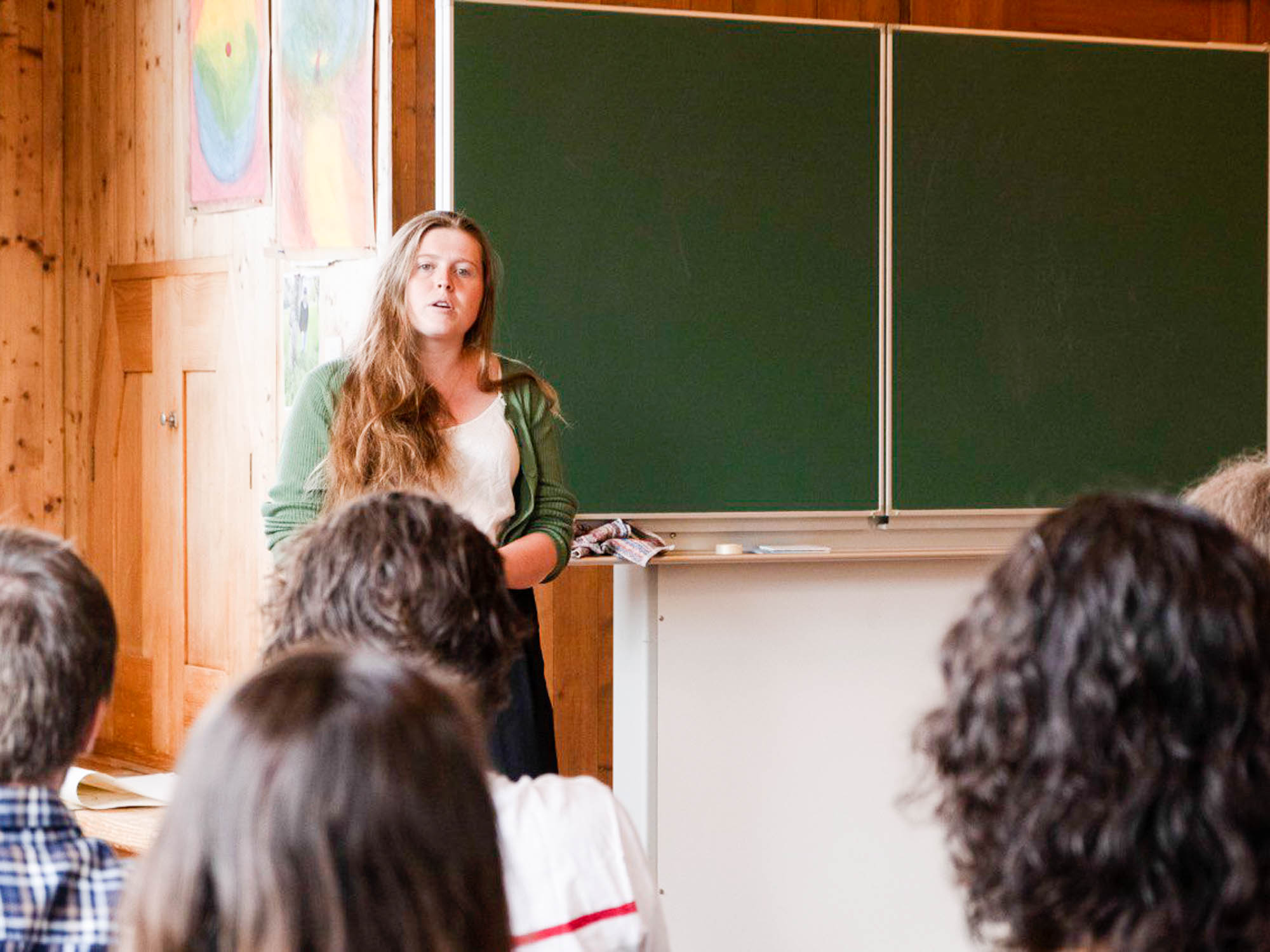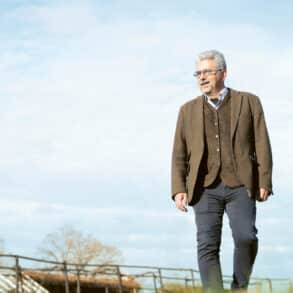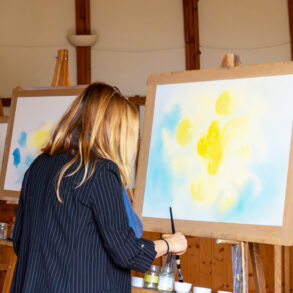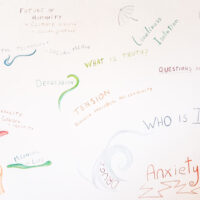Some “digital natives” of the younger generation are beginning to question the vast amount time they spend in the digital realm: both the positive potential and the grave dangers that they often have to struggle through on their own. As a part of the Goetheanum’s Anthroposophical Studies program, Ariel Turner undertook a project to reduce her time on screens, and research what strategies were effective and how her inner life changed correspondingly.
The development of technology and social media is unfolding at a rate that often exceeds what our current faculties allow us to meet and fully understand. Many of us cannot be the masters of these developments but are swept along in a tide of false realities. We can fall prey to algorithms designed to hack our dopamine, sucking us into more and more time online without our conscious will. At worst, we lose our ability to discern, regulate, and be self-directed, and become trapped in the echo chambers of our mesmerized horror. We are experiencing an epidemic of isolated, anxious, and disconnected people.
At the age of 27, I found myself swept away in the tides of online entertainment and social media, realising that if I continued with my technology habits, I would find myself further and further away from the substance of life. Upon observing the world around me and the society I am living in, I noticed that everyone was using screens, from children to grandparents and all ages in between. I always thought that as I got older, I would “outgrow” my screen use, and the realities of life would mean I no longer had the time, interest, and wish to participate in the online world and escapism that screens provide. However, having officially grown up, I was still spending many hours online with no sign of stopping. Although I wished to halt endless hours of scrolling, achieving this was a very different task, especially when considering what a well-established habit this had become throughout my teens and twenties.
As I started this project, it became clear this is not just a question of how to break well-established habits but also how to learn to live without a key coping mechanism that I had become deeply reliant on. I was turning to screens throughout my day, and this was connected to times of stress and emotional turmoil, and often to each time I sat down to eat. I was dealing with a need to fill the void of silence, boredom, and the desire to escape. Between watching Netflix shows and YouTube videos, scrolling Instagram, and online browsing, I wasted upwards of 25 hours a week. I felt out of control with myself and was in a cycle of self-deprecation and self-destruction. I felt very frustrated that I couldn’t stop and do what I wanted. A deep cycle of shame was born, and then, to soothe these feelings of discomfort, I would return to the device that had helped create it in the first place.
I knew the cycle I was in. The question became how I would break it, and how I would tackle something so profoundly personal, established, and socially normalised. Everyone knows that too much screen time is not good for you and that we must build healthy habits with screens. However, how often do we talk about it? How much time are we actually spending on screens, day by day, week by week? What is a healthy amount of screen time? How do we have a healthy relationship with our screen usage? And if we honestly start to answer these questions, do we have the will to change what we find needs to be changed?
Tracking Quantity and Quality
I set out to answer these questions in my independent research project as a part of the Goetheanum’s Anthroposophical Studies program. Over five months, I tracked my screen time, noting the quality of my soul life and the effect of my efforts to reduce screen time. Each week, I recorded the amount of time I had spent on the screens themselves, analyzed where this time went and asked myself how I might be able to change it. My goal was to reduce the time I spent on screens week by week, spending fewer hours on them than the week before. Alongside this, I explored my soul life by looking at the quality of my thinking, feeling, and willing and what changes I witnessed in them.
I took drastic measures at times, such as locking my computer in a suitcase and stashing it high on top a stack of other things. I also blocked high-usage websites on my phone and turned my phone screen to display black and white only. All these steps helped to bring it down, but the attention I placed on the issue itself was what started to shift things.
I reduced my screen time drastically in five months. I now engage in almost no escapism or mindless scrolling. I was able to claim back 20-plus hours a week. I still use a screen—it’s necessary for my modern life—but the 10-15 hours a week I find myself on the screen is used productively and is a self-directed choice.
Thinking
I have noticed a significant change in the quality of my thinking. Through these last five months, I understood how important it is to have space to allow your mind to wander and wonder. By actively reducing the amount of content I consumed, I could adequately digest and integrate new ideas as a part of my evolving fabric of thought.
The time I spent online would linger in my thought life for hours if not days. I would be hooked into narrow-minded concepts, spinning them around in a loop and not thinking more deeply. These thoughts spinning around my head were prepackaged, surface-level, and materialistic. At my worst, I would consume more and more and never get to a place of actual digestion. This weakened my power of thought; I could not develop a concept very far and would have more associative ideas rather than developing my thinking. The content that does well in online platforms triggers a quick emotional response rather than encouraging deeper, contemplative refinement.
There is a clear difference in the quality and depth of my thinking now. I have strength and resilience in my thought life, and a deeper trust because I help to create what I think, making it simultaneously more individual and universal. Additionally, the ideas from online resources can be taken further and digested with the awareness to take in less so that I can understand and grow what comes more deeply. There is also less of an emotional pull in my thinking as I have a greater desire for thoughts, and the turmoil in my feeling life has settled down.
Feeling
When I was stuck in the screen cycles, I was not in a good place. Recognizing this was one of the triggers for me to take on this project. After five months of working on it, I experienced significant changes throughout my feeling life, especially in my overall health and well-being.
Before, my feeling life was chaotic, and I found it hard to differentiate what I was actually experiencing and what I was carrying from the online world. I felt more short-tempered and would find myself easily annoyed at others. I was defining myself by what I liked and disliked from the things I was meeting online and in daily life rather than from trying to understand my unique sympathies and antipathies. I struggled with my self-esteem because I didn’t like the cycle I was in, but when I was around others, I also felt ashamed for my inability to control myself. If I wasn’t feeling on the edge, I would often feel closed off, shut down, and numb. I felt like I was not a part of this world, just watching it unfold. Whenever some hard-to-bear feeling arose, I immediately went to the online world to distance myself and not have to feel. This pattern built up many years of unprocessed emotions that, through doing this project, were able to be met and felt.
I have also noticed an ability to be much more open to others, as if there is infinite room for challenges and new feelings. I can manage my feeling life with more grace, and I am less triggered by others. I can have a balanced approach and do not have to ride out so many highs or deep lows. I can experience more satisfaction and feel more healthily engaged in my life. There is also a significant reduction in anxiety from less information overload and time online and from the strength built to bear my feeling life without running for pacification. I also don’t experience the closed-off numbness anymore. It has been exciting to experience how my feeling life wants to actively participate in the world, to understand it rather than just judging or pushing away from anything that poses a difficulty.
Willing
Before starting the project, I was struggling the most with my will. Because my will wasn’t strong enough, I couldn’t get offline or do what I wanted to do. I couldn’t focus or direct my will, and, especially after spending a few hours online, I lost all motivation to do anything but consume content. I felt disempowered. I always chose the easy option and wasted hours online, shirking engagement with anything substantive. But it also felt like the will was unfamiliar to me. What we do provides us with the reinforcement of our ideas of who we are. We build our internal reputation, proving what kind of person we are. Being unable to follow through on my wishes was not just inactivity and wasting time—it affected the possibility of knowing myself in new ways.
Screen time was sucking away my will forces. I still do not entirely understand how time online takes your forces; I’m not satisfied by explaining it as the simple consequence of consuming entertainment that takes no will. Everything is created, customized, and ready to be consumed on these platforms; it doesn’t take any willpower and gives little chance to engage or strengthen the will. It is also physically empty; only the eyes and fingers must move. The majority of activity is happening through thinking and feeling. The will is intertwined with physical movement—one loses connection with both while consuming social media.
My thinking and feeling were able to return naturally to a healthier state simply by reducing screen time, but it was a different story with the will. Simply reducing screen time was not enough to get my will moving into what I wanted to do. I had less distraction, but this didn’t guarantee action. I still felt sleepy and weak, as if my will was a ghost. I could still fulfill my responsibilities in life, but I was missing the will to direct myself out of freedom, not just responding to needs and musts. Eventually, I understood that strengthening my will was not simply a matter of getting off the screen but about engaging in activities to replace screen time and getting to know my self-directed will. This was the impulse that led to speech formation work. Working with different speech exercises over three months helped me encounter my will forces and come more deeply into my body. Starting to build this connection with my will, I understood that it is neither weak nor strong, but rather that it needs to be continuously awakened and brought into action.
Reintegration
My next step on the journey to reduce screen time is to actively build a positive relationship with screens, focusing on the possibilities that screens provide. I realise that I missed this in my research, but at the same time, it was necessary to focus on the negatives and dangers of screens to allow myself a space of separation. If I use technology in a self-directed manner, it can be a helpful tool in supporting daily life. I recognize that it’s my responsibility to work with the online world healthily and ethically, not just for myself but for the collective.
As technology continues to evolve, we must also develop and strengthen inwardly in response. One of the most significant gifts of screens is that it allows us to meet our lower nature and understand it. If we are prepared and willing, we can behold our double in the mirror of the screen. This is a new initiation point for our times. Until we become strong enough, we will continue to miss this threshold to transform. Technology sometimes unfolds faster than we can keep up, but we must always strive earnestly in our ability to hold and guide the forces at play.
Through my efforts to pull myself away from screens, I saw what is mine to still work on and strengthen. Over the coming years, I hope to build the strength to stand upright and meet this challenge of mine and humanity with grace and love.
Image Ariel Turner presenting her project at Goetheanum, Photo: Nicole Asis










Wonderful to follow your self-directed project, and to know that you took up speech formation and eurythmy! Congratulations!!!